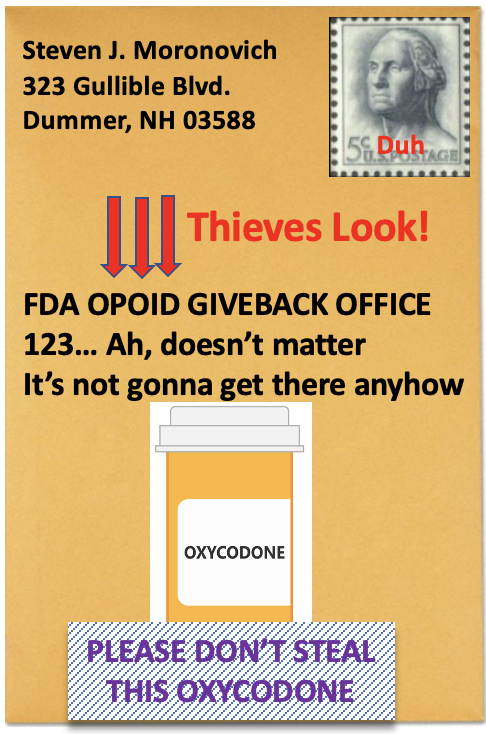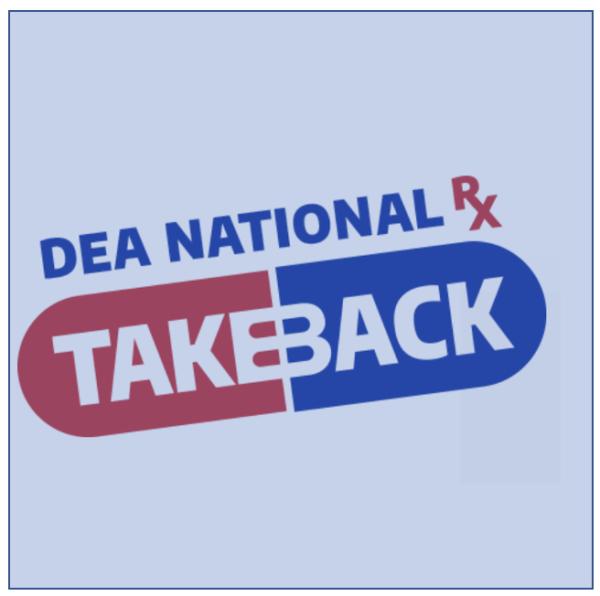Here's a message from the FDA. [Emphasis mine]:
Don’t Be Tempted to Use Expired Medicines...Out with the old! Be it the fresh start of a new year or a spring cleaning, consumers are encouraged to take stock of what has surpassed its usefulness. Medicines are no exception.
This is a size-48 waist pant load of crap. It is that wrong. More on this later.
The agency has zero credibility here, especially since it has created a monumentally dumb program where people with "excess" opioids (1) can put them in an envelope and mail them back to the FDA. What a splendid idea! I wrote about this in 2022 and 2020:
If you want to dispose of or return your unused opioids feel free to do so, but doesn't that seem a bit like returning the unused portion of your paycheck to your employer? "Well boss, I didn't use all the money this month, so here's what I didn't need."
Yours truly, Do We Really Need To Study How To Dispose Of Unused Opioids? Seriously? 12/20
And here's what I envision what the return envelope might look like:

Speaking of the drugs being stolen, I got the following comment after that story from a reader who calls himself Victor Frankenstein (presumably a pseudonym, but considering all the nutlogs that follow me, I can't be certain) after the 2022 article: Image: licensed from Shutterstock
I had mentioned this to a good friend over a couple of beers, who is also a U S Postal Service Employee. After his beer shot out of his nose, we were able to clear his airways and get a proper response. He noted that the U S Postal Workers will ensure that any of these envelopes "clearly marked" will be properly and expeditiously delivered to the proper receiving entity.
On another note: Years ago, he also informed me that a good U S Postal Service Worker can smell money in an envelope and also showed me how to remove it from the envelope without opening it. Using only a "Hair Pin"... I have a question. Is it not illegal to send narcotics through the mail? Unless of course, it's from China.Victor Frankenstein in rare form, 6/22. Comment after this article
Way to go, Vic! (Notice: The monster pseudonym program is now over. I don't want to hear from any Dick Draculas or George Godzillas.)
Time for the science
Note: I'm not encouraging anyone to take any medicine after the expiration date on the bottle. This article is merely a look at the data on drug efficacy and safety of drugs over time. You can decide for yourself what, if anything, to do with this information.
Medscape thoroughly trashes the FDA's Mr. Rogers-like advice. [Emphasis mine]
Are Drug Expiration Dates a Myth?? Note that the FDA requirement is a date at which potency is still guaranteed. In most cases, the drug in question has not been tested for efficacy or toxicity past that date. There is also no incentive in the regulations for a pharmaceutical manufacturer to look for ways to lengthen that date of expiration.
This is a blatant case of "absence of evidence vs. evidence of absence." The FDA checks drugs after one year and finds that they are OK. This does not mean that the agency tested them after five years and determined whether they were not OK. This is where the one-year warning comes from. It means almost nothing. We can conclude from the FDA's limited study that the real number could be one year or 1,000 years. There is no way to tell.
Except there is
- The Harvard Medical School reported that the military, sick and tired of regularly throwing away expensive drugs, conducted its own study:
"[T]hey found from the study is 90% of more than 100 drugs, both prescription and over-the-counter, were perfectly good to use even 15 years after the expiration date.
- Likewise, a 2012 study reported in JAMA Internal Medicine revealed:
Eight long-expired medications with 15 different active ingredients were discovered in a retail pharmacy in their original, unopened containers. All had expired 28 to 40 years prior to analysis...Twelve of the 14 drug compounds tested (86%) were present in concentrations at least 90% of the labeled amounts, the generally recognized minimum acceptable potency. Three of these compounds were present at greater than 110% of the labeled content
More specifically:
Among the drugs that were tested that maintained greater than 90% of the labeled amount were acetaminophen, codeine, hydrocodone, and barbiturates
Well, would you look at that! Vicodin (hydrocodone plus acetaminophen) pills that have been sitting around in a bottle for about 30 years are just fine, yet the FDA wants you to return them. Based on zero evidence that the drug was no longer useable.
EMC Pharma makes, among other things, OxyContin. From its product sheet:

Likewise, the shelf-life of Dilaudid (hydromorphone) is given as three years but is probably longer, maybe by a lot.
In a more extensive study, the drug giant Sandoz analyzed 122 drugs and found that 88% of them were safe to use more than 5.5 years after the expiration date. Some of these included:
- Morphine sulfate (solution): 89 months (> 7 years)
- Fentanyl citrate (solution): 84 months
- Diphenhydramine (Benadryl): 76 months
- Naltrexone hydrochloride (solution): 77 months
- Ketamine: 64 months
Some Generalities
- Almost all solid (tablet or capsule) drugs are stable past their expiration dates.
- Solutions are less stable than solids but may still be OK if stored properly.
- This does not hold true for most antibiotics, especially tetracycline, which forms a toxic isomer even when inside a capsule. Don't use expired antibiotics. Bad idea.
- Storage conditions matter. The enemies of drugs are light, heat, oxygen, and moisture. If you keep them sealed, in the dark (maybe even cold), the opioids I showed above will be useable for many years.
- But keep in mind that the FDA tells you the opposite.
What to do?
My personal opinion is based on the chemical structures of a given drug and is reinforced by the studies above. I think you have to be absolutely out of your mind to return expired opioid pills because there's an excellent chance you won't get them back when you really need them. Don't just take my word for it.
Should you be unfortunate enough to walk into the ER at Maimonides Medical Center in Brooklyn with a kidney stone, you'll run into this mentality: [Emphasis mine]
Relying on opioids as the primary analgesics for moderate to severe pain is inadequate, unsafe, and costly...I am just trying to come up with a feasible, practical solution or alternative to opioid analgesia in the emergency department... For now, it is an alternative, but who knows what may happen later on. Perhaps we will be able to eliminate opioids altogether, which would be fantastic.
- Sergey Motov, MD, Maimonides Medical Center
All of you can make up your minds, but I think I'll hang on to my small stash of 5-year-old Percocet. Ya never know when you might run into trouble, let's say, in Brooklyn.
NOTE:
(1) The term "excess opioids" is right up there with a Model-T Ford. You are unlikely to own either of them.




